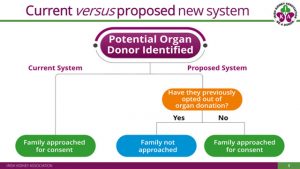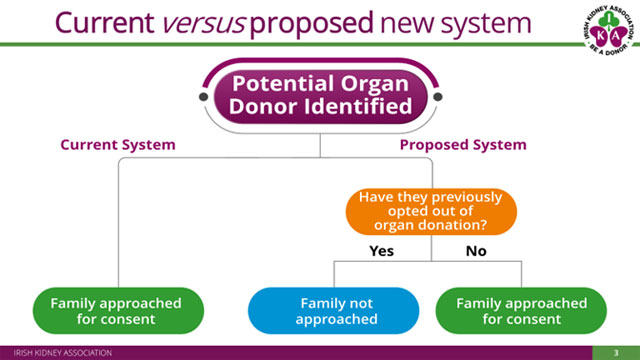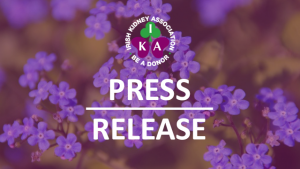Family consent still required under proposed new legislation.
The Irish Kidney Association has been raising awareness of organ donation for transplantation for over 40 years now and is part-funded by the HSE to issue organ donor cards nationally and run the annual national Organ Donor Awareness Week Campaign.
To ensure an informed public debate on the topic of organ donation for transplantation, it is important to look at the context in which this legislation is being introduced.
Firstly, only around 1% of people die in circumstances where organ donation may be possible, which means dying in an intensive care unit.1 This immediately highlights the limited possibilities for organ donation and the need for every potential donor to be identified and for consent to be given.
Secondly, under the current system, when a potential organ donor is identified, the family is approached for consent, if it is given then organ retrieval for transplantation takes place. If family consent is not given, retrieval does not go ahead.
Under the new legislation, the proposal is to bring in an opt-out register where people can register their wishes not to donate their organs and if they do so, there will be no further discussion with their family. For those who do not opt-out, the family will continue to play a central role but rather than being asked to consent to organ donation they will be asked if they know any reason why their loved one would not consent to organ donation for transplantation.
The Irish Kidney Association welcomes the government’s focus on the life affirming and life-saving act of organ donation for transplantation and we are keen to use our position and experience to help bring public clarity and understanding to how the Human Tissue Bill will impact current practices in organ donation for transplantation.
The core public messaging, in every country, around the topic focuses on the importance of sharing your wishes with family so that they are left in no doubt as to your views on organ donation for transplantation. Looking to other countries, it is evident that no hospital staff will go against the wishes of family when it comes to organ donation for transplantation, whatever legislation is in place.
It is important that when explaining the new legislation to the public that the focus is on not leaving your family in doubt. Headlines such as “Under the bill, consent will be deemed unless a person has, while alive, registered his or her wish to not become an organ donor after death” are already starting to appear which can be misleading
It is important that the media play its part in communicating that families still play a central role in consenting to organ donation. This will reinforce the value of having the family organ donation conversation before the unthinkable happens.
Under the Driving Licence application process, over one million people have proactively ticked a box to express their consent to organ donation. A very positive number given that there was no publicity around it.
It is important that we do not forget the donor and the donor family in this process. Organ donation for transplantation can be viewed by donor families as a legacy from their loved one. To quote some families; “one bright light in a very dark time” and “our loved one lives on in others.”
The Irish Kidney Association is very happy to see the subject of organ donation for transplantation move up the government’s agenda and looks forward to playing its role in bringing understanding and experience to the public conversation on the topic.
Note to Editor
The organ donor card, introduced by the Irish Kidney Association in 1978, has been the focus of the public call to action in relation to having the conversation about organ donation for transplantation. The fact that it has a space for the signature of your next of kin transforms it into an icebreaker in relation to discussing your wishes. The IKA’s Digital Organ Donor Card app also focuses on the importance of sharing your wishes with family (through your WhatsApp group, via traditional text or using the various social media channels).
Although over one million people have expressed their wish to donate on their driving licence by using the code 115. This information is not currently available to hospital staff.
These are symbols and communication tools and do not have legal status. In circumstances of organ donation, ICU staff may ask families whether their loved one carried a donor card or have code 115 on their driving licence to help understand the potential donor’s wishes.




